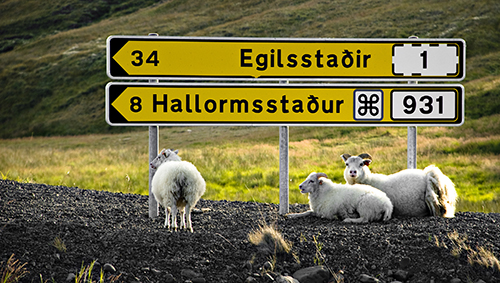英語記事に慣れる「サクっと読む英文」
2017.6.20
Could the Icelandic language disappear?
Read the article to find out why the Icelandic language is endangered.
なぜアイスランド語の存続が危ぶまれているのか、記事を読んでみましょう。

Icelandic is believed to be one of the ten oldest languages in the world. In addition, probably due to the fact that Iceland is an island nation, the language has changed very little from its traditional form, unlike most European languages. The Icelandic language is unique and suited for life in the Icelandic environment, and it is a source of pride and identity for many Icelandic people. Currently, the language is spoken by less than 400,000 people in the world.
There are two main problems for this language. The first is tourism and globalization. Tourism has become the biggest industry in Iceland these days. In fact, half of the new jobs in Iceland are being taken by foreigners. As a result, the use of English is becoming more and more widespread in the country. Teachers, for example, have observed that students in school often use English when talking amongst themselves. Additionally, some recent studies suggest that children are no longer getting enough experience with the language during their childhood to fully learn Icelandic.
The second problem comes from modern technology. Most technology these days, in particular voice-activated devices, does not recognize Icelandic. One possible reason for this is the language’s difficult rules. Another reason is that the small number of people who speak the language do not present a big enough demand for software and technology companies to include Icelandic in their products. The result is that Icelandic people are forced to use English daily to make use of modern technology, such as GPS or voice-activated robots.
Many people are worried that these problems will lead to the complete disappearance of the language. In fact, the Multilingual Europe Technology Alliance estimated that at least 2000 of the world’s languages will stop being used in the near future.
For Iceland, losing the language could mean losing their identity. Ásgeir Jónsson, an economics professor at the University of Iceland, in an interview with the Associated Press stated that switching over to English as the main language could cause professionals and experts to leave the country.
Language experts and activists such as Iceland’s former president Vigdís Finnbogadóttir are trying to prevent the language from falling out of use. The Ministry of Education estimates that creating a database that can be used to include Icelandic into digital devices would cost about 1 billion krona (about ¥12.8 billion). But the government must move quickly.
“If we wait, it may already be too late,” said Svandis Svavarsdottir, a member of Iceland’s government.
Icelandic is believed to be one of the ten oldest languages in the world. The language changed very little over time, probably because Iceland is an island country. Iceland is also far away from Europe. Most European languages have changed a lot from their beginnings. The Icelandic language is different from other languages and matches life in Iceland. Many Icelandic people are proud of their language. However, the language is spoken by less than 400,000 people in the world.
There are two main problems for this language. The first is tourism and globalization. Tourism has become the biggest business in Iceland these days. Half of the new jobs in Iceland are being taken by foreigners. So using English is becoming more and more common in the country. Teachers, for example, have noticed that students in school often use English when talking to each other. Some recent studies also show that children are not hearing enough of the Icelandic language during their childhood.
The second problem comes from technology. Most technology these days does not recognize Icelandic. One possible reason for this is the language’s difficult rules. It could also be because of the small number of people who speak the language. Because Icelandic speakers are a small market, software and technology companies feel they don’t need to use Icelandic in their products. So Icelandic people have to use English daily to use technology such as GPS or robots that understand human voices.
Many people are worried that the language will stop being used because of these problems. The Multilingual Europe Technology Alliance said that at least 2000 of the world’s languages will stop being used in the near future.
For Iceland, losing the language could mean losing their culture. Ásgeir Jónsson, a teacher at the University of Iceland, in an interview with the Associated Press said that more people may leave the country if English becomes the main language.
Some people, such as Iceland’s former president Vigdís Finnbogadóttir, are trying to save the language. The Ministry of Education says that creating a database for using Icelandic with today’s technology would cost about 1 billion krona (about ¥12.8 billion). But the government must move fast.
“If we wait, it may already be too late,” said Svandis Svavarsdottir, a member of Iceland’s government.
キーフレーズ
be concerned ~について心配している
ある事柄について心配する、または不安を抱いている、という意味です。
例:I’m concerned about his grades this semester.
(彼の今学期の成績について心配している。)
例:The problem concerns all of us.
(この問題は私たち全員に関係している。)
in the modern age 現代世界において
appear (~と)思われる
~と思われる、~のように見える(~という印象を与える)という意味の表現です。
例:They appear to be very much in love.
(彼らはとても愛し合っているように見える。)
すべて「~のように見える」と訳すことができ、通常言い換えできる場合が多いですが、含まれる意味に少し違いがあります。
■ appear / look
対象の人や物の見た目や様子、行動などの視覚から得た情報から客観的に判断しているときに使われます。
例:Sally looks tired.
(あくびをしている、目の周りにくまがある、などの視覚的な情報から判断して)Sallyは疲れたように見える。
■ seem
状況などから察して、話し手の主観で判断しているときに使われます。
例:Sally seems tired.
(いつもよりも元気がない様子から考えて)Sallyは疲れたように見える。
widespread (広い範囲に)広がった
voice activated 音声で作動する
unlike ~ ~とは違って
be suited for ~ ~に適している
あることに向いている、適している、またはふさわしい、という意味です。
例:Those high heels are not suited for hiking.
(そのハイヒールはハイキングには適していない。)
switch over 切り替える
fall out of use 使われなくなる
ある物が(あまり)使用されなくなる、廃れる、という意味の句動詞です。
例:VCRs have completely fallen out of use.
(ビデオデッキは完全に使われなくなった。)


 【Gabaからのお知らせ】
【Gabaからのお知らせ】 【特集】
【特集】 【英単語の正しい使い分け】
【英単語の正しい使い分け】 【使いこなす句動詞】
【使いこなす句動詞】